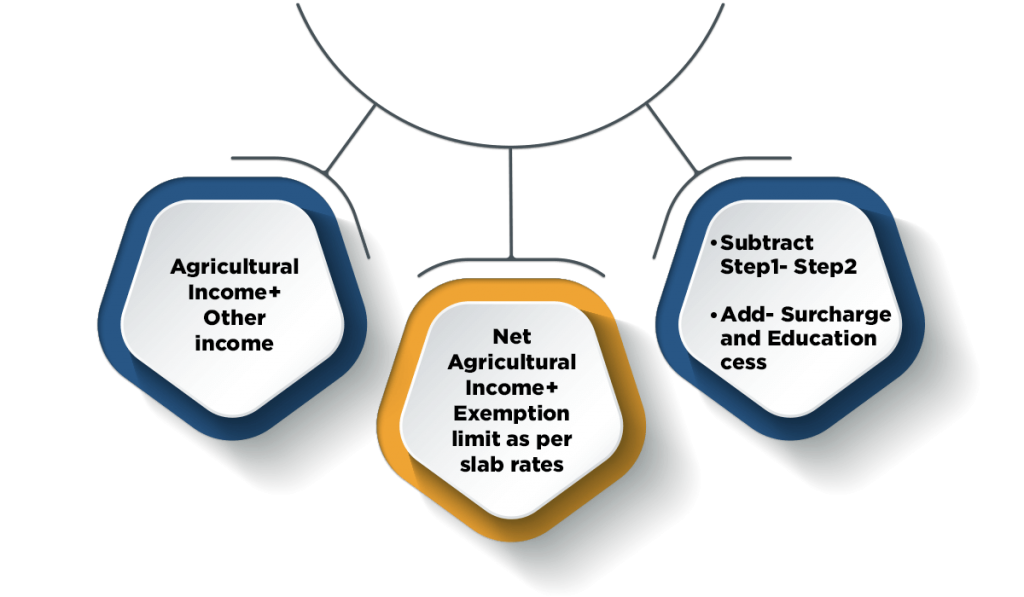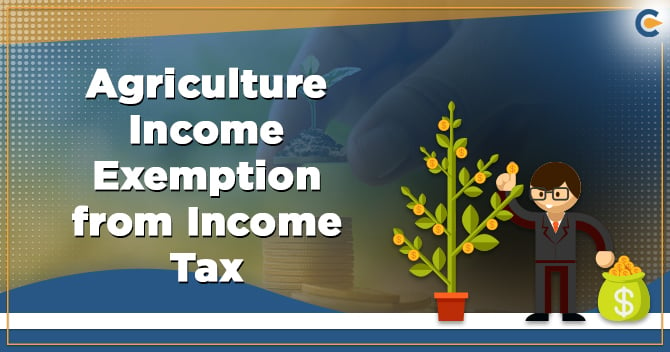An income earned, or profit derived from commercial production of agricultural land covered in an agricultural income. Other sources of agricultural income include farming land, and commercial produce from horticulture land. The agriculture income is defined under Section 2(1A) of Income Tax Act 1961. According to this section, the agriculture income is
- The revenue or rent generated from the land located in India are used for agricultural reasons
- Income earned from the land by agriculture operations like processing of agricultural products for making it market-ready and saleable
- Income derived from seedlings or saplings growing in a nursery
- Income assignable to a farmhouse, but only if it satisfies specific conditions laid down in section 2(1A)
Rent or Revenue got from Agricultural Land
Rent is a consideration for the right to use the land. There is a lot of scope of possible sources of income which can be derived from the agriculture land. For instance such fees received for renewal of grant of land on lease. However, revenue generated from land does not include consideration received the sale of land.
Income Derived from Agricultural Land
The meaning of agriculture is not covered under the Act. However it has been laid down by Honble Supreme Court in the matter of CIT v. Raja Benoy Kumar Sahas Roy where the term agriculture has been explained when it consist of two types of operations –
- The basic operations will include the cultivation of land and consequently tilling of land, planting, sowing of seeds, and other such operations that require a human skill and effort directly on the land itself.
- The subsequent operation includes the operations which have been carried out for growth and preservation of product such as weeding, digging soil around the crops etc. It also includes the operations that would fit for use in the market like tending, cutting, pruning, harvesting, etc. An income derived from the saplings or seedlings grown in a nursery would also be considered to be an agricultural income, whether or not the basic operations were carried out on land.
Examples of the Agricultural Income
The some examples of agricultural income are as follows:
- Income has derived from sale of replanted trees.
- Income has made from the sale of seeds.
- Rent received from the agricultural land.
- Income from growing of flowers and creepers.
- Profits received from a partner a firm engaged in the agricultural activities.
- Interest on capital which a partner earns from the firm, engaged in agricultural operations.
Examples of Non-Agricultural Income
The following are some examples of non-agricultural income:
- Income received from the poultry farming.
- Income received from the bee hiving.
- Any dividend which an organization pays from an agriculture income.
- Income received from the sale of spontaneously grown trees.
- Income received from the dairy farming.
- Income received from the salt produced after the land flooded with sea water.
- Purchase of the standing crop
- Royalty income received from the mines.
- Income received from the butter and cheese making.
- Receipts from the TV serial shooting in any farm house.
Read our article:Types of ITR (Income Tax Returns)
Agriculture Income can be Exempted
According to Section 10 (1) of Income Tax Act of 1961[1], an agricultural income under income tax will get an exemption. However, the agriculture income is included for calculating the tax liability if the conditions mentioned below are satisfied cumulatively-
- Net agricultural income exceeds from Rs. 5000 for the previous financial year.
- Total income, in addition to the net agricultural income, exceeds from the basic exemption limit.
For those who belong to above income categories, can calculate the tax liability by following these steps.
- Step 1: Add both agricultural income and other income
- Step 2: Add both basic exemption limit and net agricultural income
- Step 3: Then subtract the result from Step 1 and Step 2 to get the final tax liability.
For individuals who have an agricultural income up to Rs 5,000, it is essential to disclose revenue in the income tax return form. And for those whose income is above Rs 5000, the income disclosure has to be made in ITR 2.
Calculation of Agriculture Income as Shown below


The Benefit under Section 54(B)
Any individual or HUF can claim tax benefit under section 54 (B). The benefit is for tax-paying individuals who sell their agricultural land in order to buy other agricultural land.
Section 54B of Income Tax Act, 1961
The Section 54B of Income Tax Act, 1961, provides relief to taxpayers who sell their agricultural land and use the sale to acquire another agricultural land will receive the tax benefit under Section 54B of Income Tax Act. However, these conditions must satisfy firstly:
- The benefit can only be claimed by an individual or HUF
- The agricultural land has to be used by an individual or parents for agricultural purpose for at least 2 years immediately before the date on which an exchange of land occurred. In case of HUF, the land has to be used by any member of HUF.
- The taxpayer must purchase another agricultural land within 2 years from the date of selling the old land. If it is case of an incident of compulsory acquisition, then a period of acquiring new agricultural land will be assessed from a date of receipt of compensation. It must be known that under Section 10(37), capital gain must not be chargeable to tax if agricultural land which has been compulsorily acquired under any law, and for that the consideration is approved by a central government or a banking regulator received on or after 1st Apr 2004.
Conclusion
An agricultural income has been exempted from the income tax. However, the Income-tax Act has laid down the method to indirectly tax such income. The method or concept may be called as the partial integration of agricultural income with non-agricultural income.
Read our article:10 Reasons Why Filing Income Tax Return Is Vital For You











